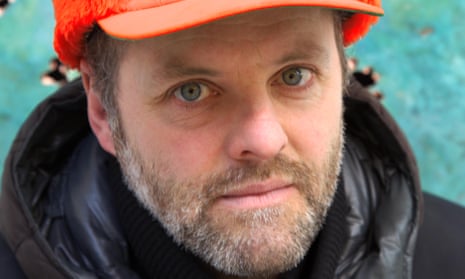The British artist Gavin Turk has said every member of the public will feel the impact of the climate emergency sooner rather than later, after he was arrested during mass civil disobedience in central London.
Turk, who was among 82 people arrested during a coordinated occupation of five bridges in the capital, said the pressure to force governments to act to reduce climate change was “the new future”.
He was among scores of people arrested for the obstruction of a public highway on Lambeth Bridge on Saturday in a mass protest to force governments to take action on climate change. He was held for several hours and released later the same day.
Turk, one of the generation of young British artists who became art superstars in the mid-90s, said he had no regrets about taking part in one of the biggest acts of mass civil disobedience for decades, organised by activists known as Extinction Rebellion.
“It seems like everyone is in an odd sense of denial about climate change,” said Turk. “I was in a quandary about what I could do. I felt taking part was a way of putting my name down and doing something for the environment. It was an incredibly peaceful demonstration and I think we put down some kind of marker. The message is really very slow to get through to people, but it will come to us all, we will all have to deal with the impact of this climate emergency.
“I hope this kind of action has caught the public imagination. It is the new future.”
The civil disobedience in London was matched by other demonstrations elsewhere in the UK, including in Cambridge. The organisers, Extinction Rebellion, want to force governments to treat the threats of climate breakdown and extinction as a crisis.
Five bridges in London, Waterloo, Westminster, Lambeth, Southwark and Blackfriars were occupied for several hours. Organisers said between 4,000 to 6,000 people attended the demonstration.
Extinction Rebellion went public with its message at the end of October. Its growth is a sign that it has caught the public imagination and is offering people the chance to make their voices heard about the need to act to stop global warming, said Tiana Jacout, one of the organisers.
“To get 4,000 plus people on the streets after such a short time is extraordinary,” said Jacout. “We are saying we don’t need to sit back and watch the slow car crash of humanity. We can do something about it. That has sparked something in people.”
The Metropolitan Police said 85 people were arrested on Saturday across the demonstration. That figure was later reduced due to duplicating reports made by officers.
In the past two weeks more than 60 people have been arrested for taking part in acts of civil disobedience organised by Extinction Rebellion, ranging from gluing themselves to government buildings to blocking major roads in the capital.
Extinction Rebellion cites the civil rights movement, suffragettes and Mahatma Gandhi as inspirations for its campaigns.
The group is calling on the government to reduce carbon emissions to zero by 2025 and establish a “citizens’ assembly” to devise an emergency plan of action similar to that seen during the second world war.
Organisers say they also hope the campaign of “respectful disruption” will change the debate around climate breakdown and signal to those in power the present course of action will lead to disaster.
The world’s leading climate change scientists have warned there is only 12 years for global warming to be kept to a maximum of 1.5C, beyond which even half a degree will significantly worsen the risks of drought, floods, extreme heat and poverty for hundreds of millions of people.
The authors of the landmark report by the UN Intergovernmental Panel on Climate Change released last month said urgent and unprecedented changes were needed to reach the target.
